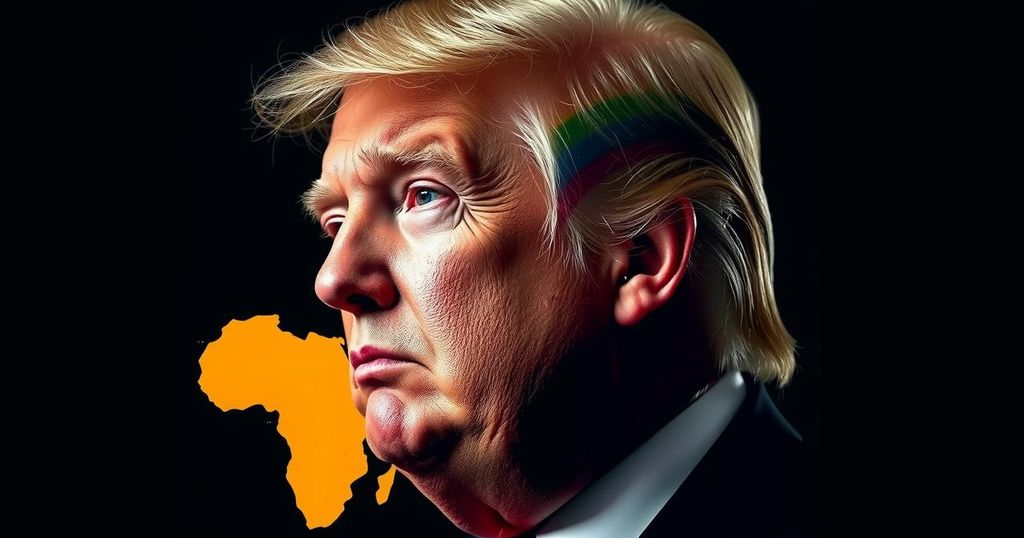The election of Donald Trump as president presents both openings and dangers for Africa, due to his preference for transactional diplomacy over traditional negotiation tactics. Past U.S. strategies fostering multilateral peacekeeping efforts are at risk as Trump’s focus may lead to alliances with authoritarian regimes. This shift marks a departure from established frameworks aimed at promoting democracy and stability, complicating the peace process in conflict-ridden nations such as Sudan and Ethiopia.
The election of Donald Trump poses both opportunities and challenges for Africa’s political landscape. Trump’s predilection for transactional politics over traditional diplomacy has implications for U.S.-Africa relations, especially regarding peacekeeping and conflict resolution. Since the Obama administration, under which the African Union collaborated with the United Nations to establish a more stable African peace and security framework, progress has stalled. Peacekeeping initiatives have diminished, with no new missions launched since Trump took office, and existing missions reduced in scope. The Trump administration’s focus on direct negotiations rather than multilateral agreements appeals to some African leaders who appreciate his straightforward approach. This was evident in diplomatic dealings with nations such as Egypt and Morocco during the pursuit of the Abraham Accords. Notably, Trump’s administration actively engaged in events surrounding the Nile waters dispute, directly influencing negotiations and U.S. foreign aid policies based on the results of those talks. The current state of Africa is marred by significant conflicts such as those in Sudan and Ethiopia, where U.S. foreign policy has demonstrated a lack of commitment to principled diplomacy aimed at promoting human rights and democracy. Instead, an inclination toward alliances with autocratic leaders, driven by results-oriented deals, has emerged. For instance, the potential for peace in Sudan hinges on the geopolitics of Middle Eastern nations, raising concerns over the entrenchment of warlord politics. An anticipated second Trump administration could further these trends, undermining the longstanding notion of ‘liberal peace’ in favor of an ‘illiberal peace’ that prioritizes immediate deals over systemic stability. The consolidation of military interests in the region may exclude U.S. leadership and exacerbate existing conflicts, notably in West Africa, where jihadist movements proliferate amid political instability. As African leaders prepare to elect new leadership within the African Union, the current geopolitical climate suggests a challenging path ahead for restoring peace through norm-based multilateral cooperation. The shifts in U.S. foreign policy initiated by Trump could define the continent’s security dynamics for years to come.
The article explores the potential impact of Donald Trump’s return to the presidency on Africa’s political landscape. Historically, U.S. administrations, particularly under Barack Obama, focused on multilateralism and collaborative efforts with the African Union to enhance peacekeeping operations. In contrast, Trump’s approach leaned toward transactional diplomacy, undermining previous efforts by prioritizing relations with specific regimes and disregarding broader democratic principles. The current state of unrest in regions like Sudan and Ethiopia illustrates the fragile status of peace and security in Africa as U.S. policy continues to shift amid political imperatives.
In summary, Donald Trump’s administration is likely to reshape U.S.-Africa relations through a transactional lens, potentially complicating efforts for sustainable peace and democracy on the continent. The decline of multilateral initiatives in favor of direct deals with individual leaders poses significant risks to stability, particularly as various conflicts persist across Africa. The upcoming leadership within the African Union faces the daunting task of navigating a geopolitical environment increasingly influenced by unilateral U.S. policies. Therefore, concerted efforts to advocate for multilateral engagement and principled diplomacy will be essential in addressing Africa’s complex challenges under Trump’s leadership.
Original Source: www.bbc.com






